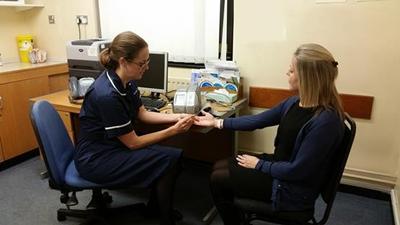Test in doctors surgeries could help preserve life of antibiotics

Researchers based in the South and East of England have been working to preserve the life of the antibiotics we have by increasing the effectiveness of when they are prescribed by family doctors and nurses.
The bacteria that cause things like coughs and colds, as well as other nasty illnesses, are becoming ever more resistant to antibiotics. Bacteria are very good at adapting, and because we keep using the same antibiotics, they are finding ways to overcome them.
The World Health Organisation fears that if things continue the way they are we could run out of effective antibiotics by 2050. That would mean in a generations' time minor illnesses could be much more serious, and even worse fatal to vulnerable people. In addition antibiotics used to protect people after surgery, chemotherapy or childbirth could be useless.
The last new antibiotics discovered were some 20 or more years ago, and it could take a long time before any new ones come along.
One way to prolong the use of the antibiotics we have is to reduce how much we use them. Sometimes antibiotics are prescribed because it's unclear if a chest infection or illness is caused by a virus or bacteria, so just in case they're given to a patient.
Professor Michael Moore, a GP himself and a research lead for NIHR CLAHRC Wessex has been conducting research to trial something called C-Reactive Protein (CRP) testing in doctors surgeries. It works by taking a small pin prick of blood from the patient and analysing it in around two minutes.
The test then gives the doctor (GP) or nurse a better indication of whether antibiotics will clear up the chest infection.
Michael began his work in the South (Wessex region) but it was only through one nurse who heard about his work that it really started to take hold more than 80 miles away near Watford in Hertfordshire.
Advanced Nurse Practitioner, Liz Cross works at Attenborough surgery in Bushey just inside the M25. She has been working in GP surgeries for a number of years and spotted Professor Michael Moore’s work and got in touch to trial CRP testing at her surgery.
“I can test people who come in with a chest infection using this test to see if antibiotics would work. They only work against a bacterial infection.
“During the winter months I must see patients with a chest infection every 15 minutes during my working day, and nearly each time I have to explain how antibiotics work or don’t work in their case. I felt there had to be something better and that’s when I spotted the CRP test research.
If patients could see the test and we could talk about antibiotics then I felt certain I could reduce the number of times they were prescribed – just in case.”
Liz has now spread the scheme to other surgeries in her area, and there are another eight surgeries to the north of her patch.
Her initial work has shown that the only 8 per cent of people who came in with a chesty cough needed antibiotics.
She adds: “I’m not alone as a nurse seeing this problem. There are nursing staff like me in emergency departments, the community and hospitals who face this same dilemma. If we could all adopt this then I think we could really make an impact.”
In support of Antibiotics Awareness Week Professor Michael Moore gave a webinar 'Assessing The Need For Antibiotics' available here.